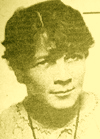An historian, evidently not cognisant of the “Theseus’ ship” problem, reinvents it:
The engine-house at Harper’s Ferry [cite of John Brown’s last stand against Federal troops] was bought by a group of speculators, taken apart, and then reassembled at the Chicago World’s Fair in 1893 where it was exhibited as John Brown’s Fort. … After the fair, the building was repurchased and set up on a farm on the Shenandoah, two miles from Harper’s Ferry. Later it changed hands again and was located at Storer College at Harper’s Ferry, a Negro college founded there in 1867. Again it was moved in the town and today, a great tourist attraction, it stands near the Shenandoah Bank, not far from the Potomac bridge which Brown crossed on the night of October 16, 1859, but closer to the arsenal site than to the armory. In all these transplantations and relayings of bricks it may not be the same building since it is probable that the dimensions of the original structure have altered and, indeed, some of the bricks may have been lost.
(Jules Abels, Man on Fire: John Brown and the Cause of Liberty, pp. 395-6.)
 Ralph Waldo Emerson commenting on the not so wild wild west:
Ralph Waldo Emerson commenting on the not so wild wild west: Unfortunately, the reviews are cutesy and idiotic (and in the case of Never Ask the End, factually inaccurate), and would never have tempted me to read the novels; but here they are: reviews of
Unfortunately, the reviews are cutesy and idiotic (and in the case of Never Ask the End, factually inaccurate), and would never have tempted me to read the novels; but here they are: reviews of